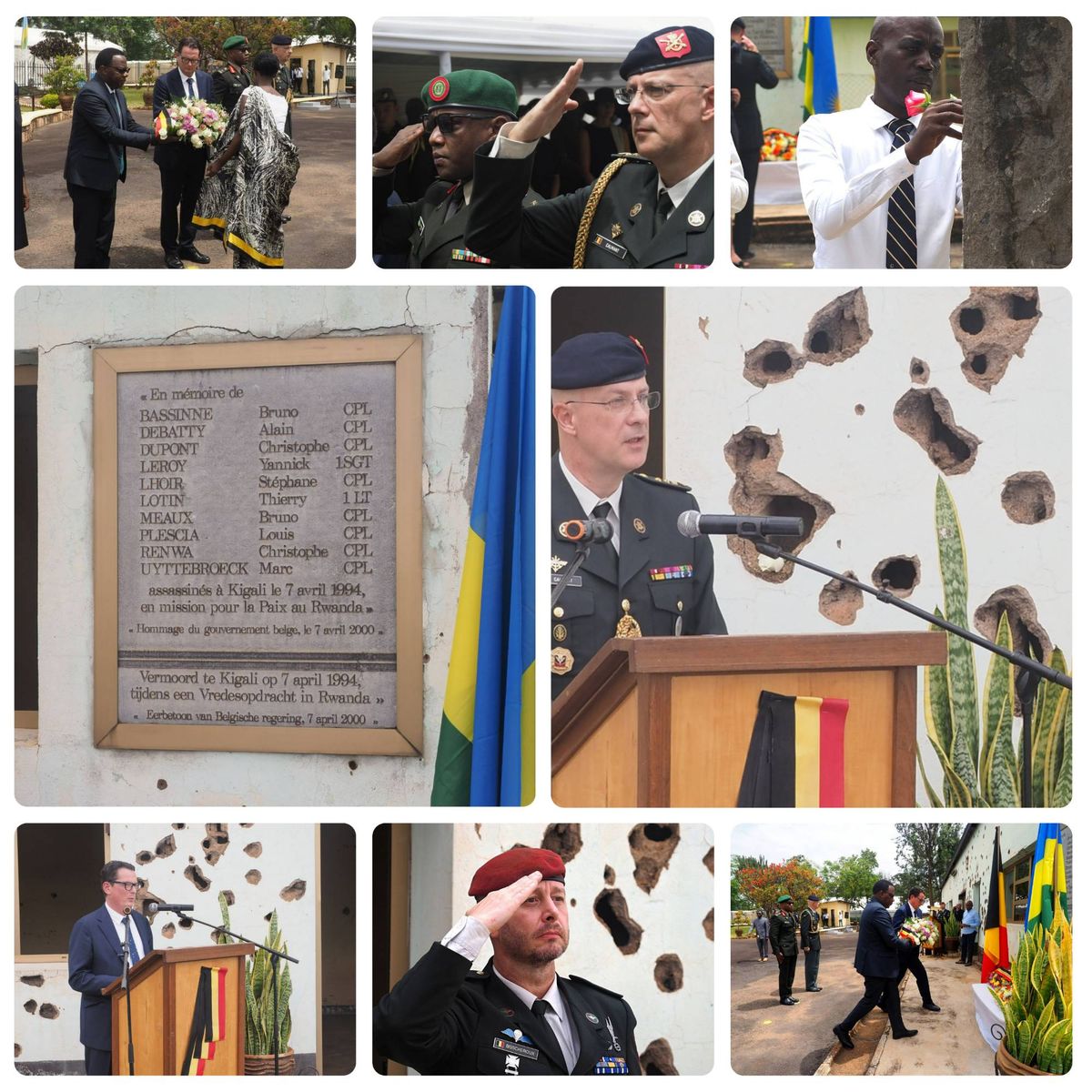Ten Belgian paratroopers died during the 1994 genocide against the Tutsis in Rwanda. Why?

I went to a ceremony this morning in what used to be the Camp Kigali barracks in Kigali. On the 7th of April 1994 ten Belgian paratroopers were savagely killed there by extremist soldiers of the ‘Forces Armee Rwandaises” (FAR). The night before president Juvenal Habyarimana and another couple of dignitaries had died when their plane was shot down by a missile, on approach to Kanombe airport. This incident sparked off the start of the 1994 genocide against the Tutsis. The ten Belgian paras were part of a Belgian battalion that was present in Kigali under the umbrella of the UN. They had received the order to protect a moderate Hutu politician who was also a minister in Habyarimana’s government. When the Hutu extremists presented themselves at the house of the minister the paras were asked to hand over their weapons. They refused at first but their superiors gave them the order to comply. After that they were brought to the sentry post of the “Camp Kigali”, army barracks in the centre of town, not far from the Belgian embassy. When it became clear to the paras that the Rwandan soldiers wanted to kill them a short fight started; one of them had hidden a revolver in his pants and another one could grab an AK-47 out of the hands of the guards. A two-hour long gun fight erupted. The odds were against the Belgians: they were outnumbered and out gunned. One of the commanders of the UN force even drove up to Camp Kigali to check what was going on but nothing was done to save their lives. Other Belgian paratroopers were posted around the Belgian embassy. They wanted to intervene but they were barked off by their officers. So our compatriots died, one by one, they were slaughtered in cold blood. The UN and the Belgian army top were never very clear about what really happened but the loss of the ten Belgian blue helmets was generally described as collateral damage, to prevent more attacks on the UN and the Belgian contingent. Especially the Belgians were becoming hunted prey for the Interahamwe and extremist Hutu soldiers in those days, after that Belgian citizens were killed in the north of the country and a couple of others were killed just outside Kigali.
I was present in Kigali during the first days of the genocide and the horror and the violence that me and many others witnessed there changed our lives. Most of the Belgians might already have forgotten what happened here, we do or cannot! I also strongly believe that the deaths of those Belgians, the whole Rwandan genocide could have been prevented if the international community would have acted better and understood better what was going to happen. For many of them the regime in place had a friendly face and a friendly smile but they hadn’t understood the devilish and the hypocrite character of it. They knew that something really bad was about to happen: local radios and newspapers had been prepping the genocide weeks and even days in advance, Tutsis were being branded as traitors and cockroaches, in the past and in the recent past several Tutsis had already been killed and the international community as well as the Belgians and the French had done nothing to stop that. Months in advance the extremist Interahamwe militia had been equipped with thousands of machetes that were bought in China and the Hutu extremist leadership had expressed openly that the whole Tutsi community should be eradicated and that nobody would bother them doing that “because Rwanda was a little country that was of no strategic value for the super powers so that nobody would stop them.
Belgium had colonised Rwanda but their role as “most friendly country in Europe’ had been taken over by the French in 1990, after it had become clear that Paul Kagame’s rebel movement, the Patriotic Front (RPF), would do everything it could to take over power and to topple the regime in place. I was also present in Gabiro in 1990 when the RPF launched its first attacks. And I continued to cover the events in Rwanda before the 1994 genocide. We all witnessed what was going on but nobody moved one finger. Way before the genocide the French started to train the Interahamwe, the regime was still in very close contact with Belgian political parties such as the conservative CVP (catholic). Other Belgians had written the Hutu constitution and Belgian missionaries were still playing a very big role in the economy and social organisation of Rwanda. They had never understood (and many of them still do not!) that the nice smiling and church going Hutu majority was being led by killers who were inn to it for their own benefits. The genocide was planed well way before, the killers knew exactly in advance who to kill and where to find them. The theories about who shot down Habyarimana’s plane are therefore less relevant. Any other incident would and could have triggered off the genocide. It was well prepared and the UN, the Belgians and the French were very well informed about this.
The 1994 genocide against the Tutsis in Rwanda also made clear that role that Belgium once played in the African Great Lakes Region and in Congo became nearly inexistent. Before that the Belgians were still trusted informers of the Americans and the French. All that was becoming part of the Belgian colonial history. When the ten paras died in Kigali the Belgian government scrambled to pull out the entire Belgian contingent. Much to the discontent of many other Belgian paratroopers who had witnessed how their comrades had been sacrificed. Some of them even started burning their blue UN-berets in front of the news camera’s. The several foreign UN contingents in Rwanda could have stopped the genocide in which nearly one million innocent people ware slaughtered. Prime ministers such as the Belgian Willy Claes and with him the whole Belgian catholic establishment pulled their tails between their legs and that was it!
It is true that nobody could have predicted that things would take this turn and that the situation would get out of hand so badly. But I’m convinced that the ten Belgian paras could have been saved if their superiors would have acted better and more convincingly: they fucked up big time! And the way the whole incident was presented afterwards by these same politicians is not acceptable as well. A lot of Hutu extremist leaders of the same calibre as the ones that gave the order to kill the paras found shelter in Belgium and in Europe where they were allowed the freedom to develop new and fake theories that the genocide was the result of Tutsi aggression and that as many Hutus died as Tutsi’s. Africa was not longer an important issue any longer for most of the Belgian and the European media. They fell back on using the cliché’s that were forged by a couple of media-influencers and journalists who were well connected to the Hutu extremist lobby. The Belgian national television played a very big role in that process.
It is a positive thing that the Belgian embassy is putting a lot of effort in commemorating these tragic events. The new batch of Belgian diplomats has managed to get rid of the colonial and paternalistic approach of their predecessors. They cannot be blamed for the mistakes that were made by their already retired colleagues and old school conservative politicians who still do not want to admit that they made the wrong calls about Rwanda. Soldiers obey orders and the ten paras who died for nothing in Kigali did their jobs. Young Belgian soldiers should know that their lives mean nothing or nearly nothing for biased politicians who are only interested not to lose too many votes in later on elections or who just want to cover up their mistakes. Belgium has lost its touch with the reality in the African Great Lakes Region. This is mainly caused by the poor and unbalanced reports of the Belgian media who have lost their links with this region.
My thoughts are with the murdered Belgian paras. But also, with the nearly one million Rwandan victims of this madness. I saw most of all this happen in front of my own eyes. Their relatives and children have to live with their loss every day. Don’t forget them!
Marc Hoogsteyns
